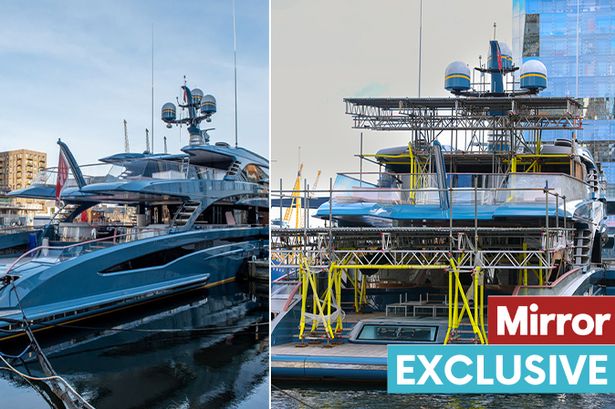The £39 million superyacht Phi, a gleaming symbol of wealth and luxury, now sits ignominiously shrouded in scaffolding in the heart of London’s Canary Wharf. Seized in March 2022 by the UK government amidst a wave of sanctions targeting Russian oligarchs following the invasion of Ukraine, Phi has become a highly visible emblem of the international effort to pressure Russia. The yacht’s owner, Vitaly Vasilievich Kochetkov, a property tycoon with ties to the Kremlin, has seen his prized possession transformed into a floating testament to the geopolitical tensions gripping the world. The seizure marked a significant moment in the UK’s response to the conflict, demonstrating the government’s resolve to target the assets of those perceived to be enabling the Russian regime. Phi’s prominent location serves as a constant reminder of the ongoing conflict and the economic measures being employed to influence its outcome.
The story of Phi’s capture and subsequent impoundment is a complex tapestry woven with legal intricacies, political maneuvering, and the human drama of individuals caught in the crossfire of global events. Kochetkov, while not directly implicated in the invasion, found himself ensnared by the wide net cast by international sanctions. The UK government, along with other Western nations, argued that seizing the assets of wealthy Russians with close ties to the Kremlin was a crucial step in applying pressure on President Putin. The justification for these actions rests on the premise that these individuals, through their wealth and influence, contribute to the regime’s stability and ability to wage war. The legal battles surrounding the seizure are still ongoing, with Kochetkov challenging the legitimacy of the government’s actions and seeking the return of his property. The case highlights the complexities of international law and the challenges of balancing individual property rights with national security concerns in times of conflict.
Phi itself is a marvel of modern engineering and design. At 58.5 meters in length, it boasts sleek lines and cutting-edge technology, offering a glimpse into the opulent world of the super-rich. Its name, derived from the Greek letter φ, representing the golden ratio, is a nod to its aesthetically pleasing proportions. Prior to its seizure, Phi was a symbol of Kochetkov’s success, a floating palace equipped with every conceivable luxury. Now, encased in scaffolding, its elegant exterior obscured, it stands as a stark contrast to its former glory. The scaffolding, erected for ongoing maintenance and preservation, ironically serves as a visual representation of the yacht’s captive state, a poignant reminder of its owner’s predicament.
The seizure of Phi has sparked considerable debate and discussion, raising questions about the effectiveness and fairness of sanctions targeting individuals connected to, but not directly involved in, the actions of a government. Critics argue that such measures can be seen as a form of collective punishment, unfairly impacting individuals who may have no direct influence over political decisions. They also point to the potential for legal challenges and the long-term implications for international relations. Supporters, on the other hand, maintain that these sanctions are a necessary tool to exert pressure on authoritarian regimes and deter further aggression. They argue that the financial impact on individuals close to the ruling elite can create internal pressure for change and ultimately contribute to a peaceful resolution of conflicts. The debate surrounding the effectiveness and ethics of sanctions remains ongoing, with no easy answers in sight.
The case of Phi also highlights the broader issue of the increasing use of economic sanctions as a tool of foreign policy. In recent years, sanctions have become a common response to geopolitical crises, targeting individuals, businesses, and even entire countries. While proponents argue that sanctions can be an effective way to achieve foreign policy objectives without resorting to military intervention, critics raise concerns about their humanitarian impact and their potential to exacerbate existing tensions. The debate surrounding the use of sanctions is complex and multifaceted, involving considerations of international law, human rights, economic stability, and political strategy. Finding the right balance between applying pressure and avoiding unintended consequences remains a significant challenge for policymakers.
As Phi remains moored in Canary Wharf, its fate hanging in the balance, it serves as a potent symbol of the interconnectedness of global events and the far-reaching consequences of political conflict. The yacht’s seizure, a seemingly isolated incident, represents a microcosm of the broader tensions between Russia and the West, highlighting the complex interplay of economic power, international law, and individual rights. The ongoing legal battle surrounding Phi’s ownership will not only determine the future of the yacht itself but also contribute to the evolving legal framework governing the use of sanctions as a tool of foreign policy. The story of Phi, therefore, is more than just the tale of a seized superyacht; it is a reflection of the complex challenges facing the international community in a world increasingly defined by geopolitical uncertainty and economic interdependence.














